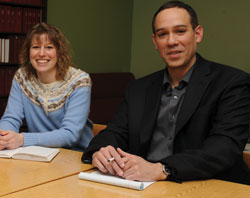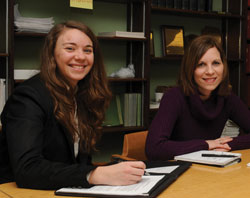|
SUNY Fredonia’s volunteer impact is well known, with roughly 13,000 student volunteer hours contributed annually. Now, thanks to the creation of the Fredonia Academic Community Engagement (FACE) Center, traditional volunteering on campus has evolved into more strategic, long-lasting and meaningful experiences for both students and the community.
University officials are so excited about the center’s potential to richly benefit students and the region that President Dennis Hefner identified it among 10 high-profile achievements in his spring semester “All-Campus Address.”
Civic engagement, sustainability, service learning and community- based research are the four FACE Center pillars, designed to promote greater collaboration between the campus and community. Four veteran faculty members – Political Science Chair David Rankin, English Professors Christina Jarvis and Emily Van Dette, and Chemistry Professor Sherri Mason – were enlisted to manage the center in its initial year. Each brought his/her own expertise, as well as more than 30 years of combined experience at Fredonia, and a common passion to strengthen the campus-community network.
In past years, some professors incorporated service learning components into their courses. Others conducted research in the community. Activities such as Earth Week and youth voter mobilization have been notable successes. But there was never any formal structure to align these initiatives, explained Vice President for Academic Affairs Virginia Horvath.
“It was never coordinated on a large scale. We have never had them as part of an umbrella of activities,” Dr. Horvath said.
According to Dr. Rankin, the FACE Center director, “SUNY Fredonia students are benefitting from the knowledge and expertise gained through service learning, internship possibilities, and related projects and activities, while contributing to meaningful campus community partnerships.”
Most FACE initiatives will be arranged so students can earn academic credit. For example, students in Rankin’s “Media and Politics” course this past spring had the opportunity to earn a fourth credit as part of a service learning project with the League of Women Voters of Chautauqua County.
The civic engagement pillar develops and applies knowledge and skills through political and non-political processes by active citizens contributing to the community. Rankin is developing and facilitating discourse and awareness on critical issues through the use of forums and activities that encourage civic dialogue and action.
The goal of the sustainability component, which dovetails with the campus “Go Green” initiative, is to unite community interests, expertise and needs with campus resources to support local projects. Dr. Jarvis, a co-founder of the Sustainability Committee and chair of 2009’s Earth Week, oversees this area.
Jarvis’ duties include identifying partners and connecting them with students and classes, working with environmental groups on programming, organizing events, integrating sustainability into course curricula, and working with the grants office to obtain funding.
“The goal is for both students and community to benefit. Our partners have special expertise and real-world skills that they can share with students, and our students bring a tremendous amount of energy, passion and disciplinary expertise,” she added.
Dr. Mason, coordinator of community-based research, wants to go beyond teaching the basics or tools of a singular discipline to address the “interconnectedness of the whole” and show students how to put those tools into action.
Through Mason’s efforts, the center worked with the Sustainability Committee, which hosted the first campus Earth Week two years ago, to take community engagement and educational activities to a new level during Earth Week 2010. These included a Chautauqua County Green Expo to promote recycling and conservation, and “Shake the Habit,” an event that asked all area retailers to forego using plastic bags on April 22, the 40th anniversary of Earth Day.
As the service learning coordinator, Dr. Van Dette facilitates the integration of community involvement with academic work. Service learning integrates course instruction with community service to spur civic learning and responsibility, enrich academic pursuit and connect the campus and community.
“I’ve noticed that my students seek out and value ‘real-world’ experiences, and integrating community involvement and service is one important way to provide those crucial, authentic learning experiences,” said Van Dette, who is also a Fredonia alumna (Class of ’98) and brings the added perspective of being a former student.
In a service learning course, students’ knowledge, critical awareness and skills are enhanced by meaningful opportunities that serve the community, she explained. And by collaborating with experts, professionals and community leaders, students learn communication, as well as civic and professional skills, that go beyond the classroom.





